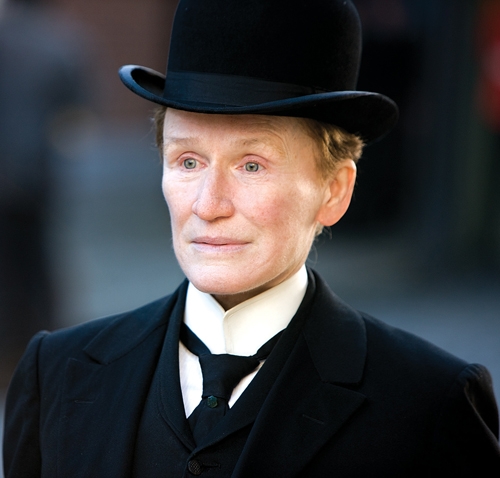Glenn Close realizes her dream of playing a woman in disguise as a man in Albert Nobbs
Justin Li
Contributor

At a costume party, a drunken doctor (dressed as a doctor) asks the head waiter, “why aren’t you in a fancy dress?”
“Me, sir? But I’m a waiter,” the waiter responds.
“And I’m a doctor! We are both disguised as ourselves!” The doctor doesn’t know how true his words are.
The waiter is Albert Nobbs, a consummate service professional. He is a quiet, stoic, and dutiful old man who keeps strictly impersonal relationships. He keeps to himself, does not speak if not spoken to, and is generally humdrum. But the most interesting thing about the uninteresting Mr. Nobbs is the fact that he is a woman. For semantic reasons, I will be referring to Albert Nobbs as “him.”
In order to survive the harsh socio-economic times of 19th-century Ireland, a woman, played by Glenn Close, dresses as a man in order to find work as a waiter. Working at a hotel, he relegates himself to a life of constant subordination and complacency with secret ambitions of grandeur, until a freelance painter named Hubert Page (Janet McTeer) is employed at the hotel.
By way of a humorous chance incident, the two reveal their concealed female identities to each other, and with help from Hubert, Albert slowly begins to break from his chains and fulfill his true life ambitions, such as owning a business and marrying a hotel maid (Mia Wasikowska), who in turn is hopelessly infatuated with the hotel handyman (Aaron Johnson).
The film was co-written by Close herself, but it could have easily been written by the likes of Jane Austen. Rife with themes of class, gender, and social hierarchy, this is the story of a person trying to find love amidst the difficulties of social conventions and anachronistic rules of orthodox conduct.
In 19th-century Ireland, only men could own businesses and marry women. A working class lesbian, Close’s character is effectively on the bottom rung of the social ladder. In order to be who she is, to love whomever she wants, and to be whatever she wants to be, she must disguise herself as a man, making the doctor’s prior statement heavy with deep poetic truth. In fact, Hubert makes this ironic compromise evident. He is able to marry another lesbian under the guise of his fictitious male persona, and lives a happy, “normal” life (similar to the plot of the 1999 film Boys Don’t Cry).
Having lived an asexual life for so long, Nobbs’ gender identity is confused. In one scene, Hubert asks him what his name is, to which he replies, “Albert.” When Page persists, Nobbs whispers, “Albert.” Although he eventually accepts his identity as a man, years of involuntary celibacy and inexperience makes it hard for him to court another woman—one of the funniest sequences in the film shows him learning how expensive it is to woo them.
However, much like its titular protagonist, the film never truly transcends its self-imposed restraints. It is never really a love story, and never really a true drama. Again, it’s very Austen-esque. The film can also be accused of trying too hard to be “masterpiece cinema.” Like The King’s Speech in 2010, Albert Nobbs shares a similar tone and theme that will likely appeal more to Academy voters than a general audience.
Despite that, it does succeed by virtue of its great acting. The film is clearly a project that is near and dear to Close, and her passion for the subject matter translates seamlessly onto screen. Her performance as a man is eerily accurate, due in part to her uncanny, if somewhat unfortunate, resemblance to both Robin Williams and Willem Dafoe. McTeer, on the other hand, is discernible from the start.
In fact, Close’s acting is so believable that you might think that she’s playing an unconventional role just for the challenge of it, à la Robert Downey Jr. in Tropic Thunder.
For her efforts, Close was nominated for Best Actress at the Oscars, and it’s a crying shame that she didn’t get nominated for Best Actor as well.


